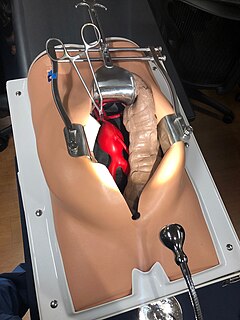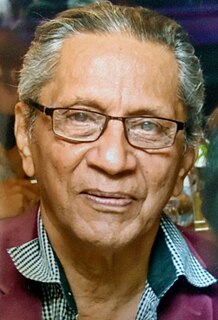
Urology, also known as genitourinary surgery, is the branch of medicine that focuses on surgical and medical diseases of the male and female urinary-tract system and the male reproductive organs. Organs under the domain of urology include the kidneys, adrenal glands, ureters, urinary bladder, urethra, and the male reproductive organs.

Vascular surgery is a surgical subspecialty in which diseases of the vascular system, or arteries, veins and lymphatic circulation, are managed by medical therapy, minimally-invasive catheter procedures, and surgical reconstruction. The specialty evolved from general and cardiac surgery, and includes treatment of the body's other major and essential veins and arteries. Open surgery techniques, as well as endovascular techniques are used to treat vascular diseases. The vascular surgeon is trained in the diagnosis and management of diseases affecting all parts of the vascular system excluding the coronaries and intracranial vasculature.

Hyperparathyroidism is an increase in parathyroid hormone (PTH) levels in the blood. This occurs from a disorder either within the parathyroid glands or outside the parathyroid glands. Symptoms of hyperparathyroidism are caused by inappropriately normal or elevated blood calcium leaving the bones and flowing into the blood stream in response to increased production of parathyroid hormone. In healthy people, when blood calcium levels are high, parathyroid hormone levels should be low. With long-standing hyperparathyroidism, the most common symptom is kidney stones. Other symptoms may include bone pain, weakness, depression, confusion, and increased urination. Both primary and secondary may result in osteoporosis.

Endocrine surgery is a surgical sub-speciality focusing on surgery of the endocrine glands, including the thyroid gland, the parathyroid glands, the adrenal glands, glands of the endocrine pancreas, and some neuroendocrine glands.

Parathyroidectomy is the surgical removal of one or more of the (usually) four parathyroid glands. This procedure is used to remove an adenoma or hyperplasia of these glands when they are producing excessive parathyroid hormone (PTH): hyperparathyroidism. The glands are usually four in number and located adjacent to the posterior surface of the thyroid gland, but their exact location is variable. When an elevated PTH level is found, a sestamibi scan or an ultrasound may be performed in order to confirm the presence and location of abnormal parathyroid tissue.
Pediatric endocrinology is a medical subspecialty dealing with disorders of the endocrine glands, such as variations of physical growth and sexual development in childhood, diabetes and many more.

John Heysham Gibbon, AB, MD, was an American surgeon best known for inventing the heart–lung machine and performing subsequent open heart surgeries which revolutionized heart surgery in the twentieth century. He was the son of Dr. John Heysham Gibbon Sr., and Marjorie Young Gibbon, and came from a long line of medical doctors including his father, grandfather Robert, great-grandfather John and great-great grandfather.

Primary hyperparathyroidism is usually caused by a tumor within the parathyroid gland. The symptoms of the condition relate to the elevated calcium levels, which can cause digestive symptoms, kidney stones, psychiatric abnormalities, and bone disease.

Endocrine diseases are disorders of the endocrine system. The branch of medicine associated with endocrine disorders is known as endocrinology.
The Society of American Gastrointestinal and Endoscopic Surgeons (SAGES) is a 501c6 non-profit professional organization providing education on gastrointestinal minimally invasive surgery. It describes itself thus: The mission of the Society of American Gastrointestinal and Endoscopic Surgeons is to innovate, educate and collaborate to improve patient care.
The Association for Academic Surgery is the world's largest organization dedicated exclusively to the promotion of surgical research. It has about 3,000 active and senior members. Its annual meeting is the association's main forum to communicate scientific progress in surgery. Until 2005, the association held its own meetings. These meetings were hosted by surgical university departments in the United States. In 2006, the organization merged its annual meeting with the annual meeting of the Society of University Surgeons to form the "Academic Surgical Congress".
The American Association of Clinical Endocrinology (AACE), formerly known as the American Association of Clinical Endocrinologists, is a professional community of physicians specializing in endocrinology, diabetes, and metabolism. AACE's mission is elevating clinical endocrinology to improve global health. The association is headquartered in Jacksonville, Florida, US.

Sivapatham Vittal is an Indian surgical endocrinologist, considered by many as the Father of Surgical Endocrinology in India. The Government of India honored Vittal in 2011, with the fourth highest civilian award of Padma Shri.

Raghu Ram Pillarisetti is an Indian surgeon, the youngest recipient of the Overseas Gold Medal of the Royal College of Surgeons of Edinburgh and the Founder-Director of KIMS-Ushalakshmi Center for Breast Diseases at KIMS Hospitals, the first dedicated and comprehensive facility for breast healthcare in the Indian subcontinent. He is also the Founder of Ushalakshmi Breast Cancer Foundation, a not for profit organisation working in tandem with government and non government bodies for spreading awareness about breast cancer and Pink Connexion, the first newsletter from India, a quarterly, about breast healthcare.
Souzan El-Eid is a breast surgical oncologist at Comprehensive Cancer Centers of Nevada (CCCN), and serves as the medical director of the Breast Care Center at Summerlin Hospital, cancer liaison physician for the cancer program and co-chair of the Breast Tumor Board at Summerlin Hospital. She is also the president elect for Clark County Medical Society. She is an Adjunct Associate Professor of General Surgery at Touro University Nevada and has served as principal investigator for several clinical research studies. She is the first breast surgeon in Las Vegas certified in both ultrasound and stereotactic breast biopsies.
Julie Ann Sosa, MD, MA, FACS, is professor and chair of the Department of Surgery at the University of California, San Francisco (UCSF) and holds the Leon Goldman, MD, Distinguished Professorship in Surgery. She currently serves as the Treasurer of the American Thyroid Association and Editor-in-Chief of the World Journal of Surgery.

Antonio Bernardo is an Italian-American neurosurgeon and academic physician. He is a Professor of Neurological Surgery and the Director of the Surgical Innovations Laboratory for Skull Base and Microneurosurgery in the Department of Neurological Surgery at Weill Cornell Medical College. He has gained significant notoriety for his expertise in skull base and cerebrovascular surgery, and has published extensively on minimally invasive neurosurgery. He is a pioneer in the use of 3D technology in neurosurgery and a strong advocate for competency-based training in surgery.

Dr. Ravin Laxman Thatte is a doyen a professor in the field of Plastic and Reconstructive Surgery, a teacher to most plastic surgeons in India, an Indian philosopher and an active environmentalist.
Herbert (Chaim) Dardik was a vascular surgeon who served as the chief of vascular surgery at Englewood Hospital and Medical Center in Englewood, New Jersey, and founded that institution's first vascular surgery fellowship program in 1978. Dardik made many developments in vascular surgery, including the first tissue-engineered bypass graft used to prevent gangrene and save lower limbs. In 2017 he earned the Society for Vascular Surgery's Lifetime Achievement Award for his contributions to the profession.
Sanjay Kalra is an Indian endocrinologist working at Bharti Hospital, Karnal, Haryana. A graduate of Christian Medical College, Ludhiana, he completed his post-graduation (MD) in Medicine at Pandit Bhagwat Dayal Sharma Post Graduate Institute of Medical Sciences, Rohtak, and fellowship (DM) in Endocrinology and Metabolism at All India Institutes of Medical Sciences, New Delhi. Kalra is currently the President of Endocrine Society of India and Vice President of South Asian Federation of Endocrine Societies. He also serves on the executive council of the Research Society for Study of Diabetes in India. He has over 500 PubMed indexed articles to his name, and has fostered bilateral and multilateral links between various Afro Asian countries in the field of endocrinology. He has developed the terms Glucocrinology and Lipocrinology. and the Gluco Coper tool to assess coping mechanisms. Winner of the DAWN Award (2009). He has also published the concepts of diabetes fatigue syndrome, euthymia in diabetes, quaternary prevention in endocrinology, and quinary prevention.










